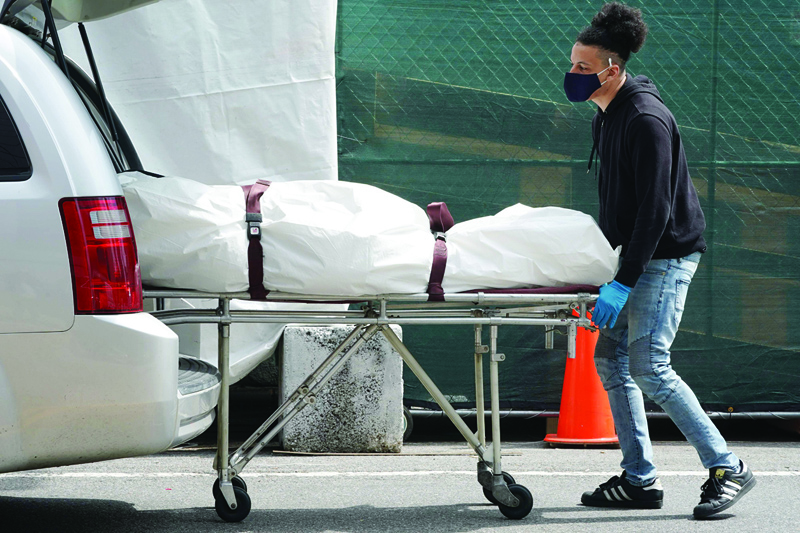
NEW YORK: A New York emergency doctor who treated coronavirus patients has killed herself, with family, police and physicians linking her death to trauma faced by health care workers battling the outbreak. Lorna Breen, 49, died on Sunday from self-inflicted injuries in Charlottesville, Virginia, where she had been staying with her family, police said in a statement.
Breen ran the emergency department of New York-Presbyterian Allen Hospital in Manhattan, a facility that has seen a huge influx of COVID-19 patients. While it is not clear why she took her own life, her family, police and doctors suggested stress caused by the outbreak had contributed to her death. "She tried to do her job and it killed her," her father Philip Breen told The New York Times.
He said she had no history of mental illness and had contracted coronavirus herself before returning to work and then being sent home. "Frontline healthcare professionals and first responders are not immune to the mental or physical effects of the current pandemic," said Charlottesville police chief RaShall Brackney. The president of the American College of Emergency Physicians, of which Breen was a member, said her death was a tragic reminder of the suffering that many health care workers are going through.
"The impossibility of the situation in many of our hospitals leaves us deeply wounded. "I can only imagine for Dr. Breen it was more than she could bear-not out of weakness, but out of the strength of her compassion," William Jaquis said in a statement on the group's website. The hospital where she worked described her as "a hero who brought the highest ideals of medicine to the challenging front lines of the emergency department." More than 17,300 people have died from COVID-19 across New York state, the epicenter of America's outbreak.
Virus antibodies
For the first time Tuesday, hundreds of New Yorkers were able to get tested for COVID-19 without having serious symptoms or underlying health issues-hopeful they had already contracted and beaten the potentially deadly disease. Dozens of people wearing masks-many young and seemingly healthy-waited their turns at branches of the New York medical chain CityMD to find out if they had had the novel coronavirus.
For weeks, tests have been reserved for the most ill or for those most at risk of serious complications. But now CityMD-which specializes in walk-in consultations-is one of the first organizations to announce that virus and antibody testing would be available to anyone, starting Tuesday. In New York-one of the worst-hit areas in the world with 17,000 confirmed or probable COVID-19 deaths out of 157,000 confirmed cases-the question on everyone's mind is:
Have I already had the virus? Now-unemployed hairdresser Ariel Krupnik, 32, was among those willing to wait two hours for a $300 blood test that could reveal within three to five days whether he has developed antibodies against the coronavirus. He never had any symptoms. But he thinks his health insurance will cover the test, and finding out he has already had the virus would be "like a nice little, like, spring gift," Krupnik said.
Even if the results are not 100 percent reliable, and even if it is not proven that antibodies confer total immunity, Krupnik said a positive result would mean feeling less compelled to stay inside constantly, only looking forward to his weekly supermarket trip. And it would mean he might be able to donate blood for the plasma therapies that many hospitals are testing for coronavirus patients. "I can go help out other people that are having it, you know," Krupnik said.
'Curious'
The motivation is similar for 26-year-old Pauline Guardenti, a French woman who has lived in New York for eight years. "I saw that we could donate our blood-that's why I'm doing it," she said. "Truthfully, I don't really care if I had it or not. There aren't really enough studies to know if we are immune or not." Ariela Rubin, 37, usually works as a waitress in a vegetarian restaurant that is now closed due to the pandemic.
She said she had symptoms of the virus in February, when most people in New York were not paying much attention to the outbreak of a new virus in China. Rubin said she is "curious" to know whether she contracted the coronavirus earlier this year. But the sight of a crowded waiting room on Tuesday made her nervous-for fear of contagion in case she had not actually had the virus-and Rubin said she planned to postpone her visit until the next day.
With tests available to nearly everybody, authorities in New York hope to be able to better track the spread of the disease, an important step in drawing up plans for how economic activity-currently suspended until May 15 - can resume in the city. Recent antibody tests on a sample of 7,000 people indicate that almost one in four New Yorkers may have already been exposed to the virus, according to the state's governor Andrew Cuomo. That could mean that more than two million of the city's 8.6 million residents have already contracted it, more than 12 times the number of existing confirmed cases.- Agencies










